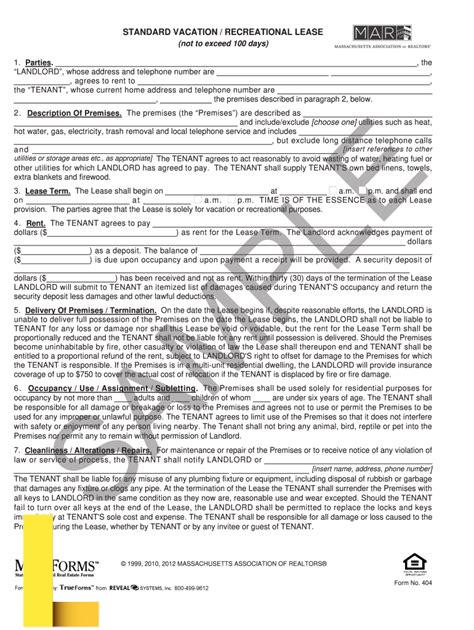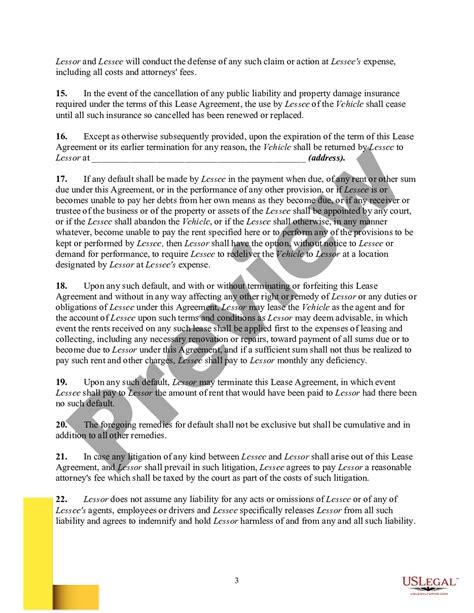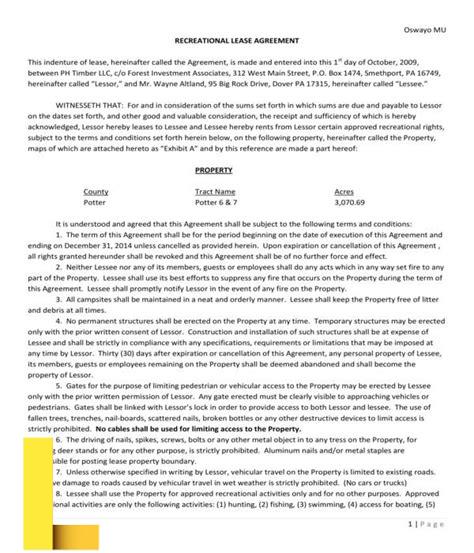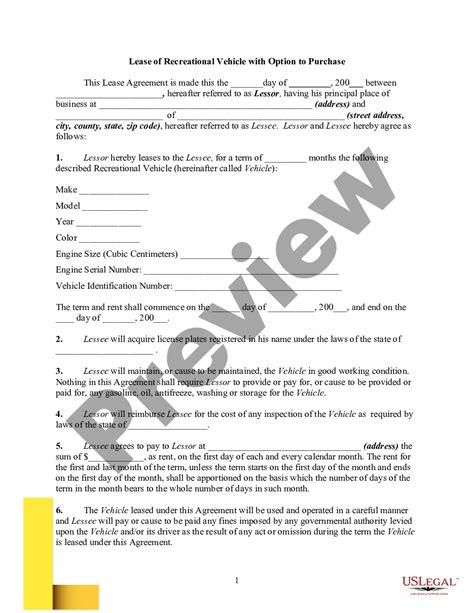The Ultimate Guide to Recreational Lease: Unlocking Your Dream Getaway

Kind reader, are you looking for a way to enjoy the great outdoors without the hassle and expense of owning your own property? Consider a recreational lease, which allows you to use private land for hunting, fishing, camping, and other recreational activities. With a recreational lease, you can experience the freedom and adventure of outdoor pursuits while avoiding the commitments and responsibilities that come with ownership. What’s more, a recreational lease often comes with access to amenities such as cabins, RV hookups, and stocked lakes, making your time outdoors even more enjoyable.
What is Recreational Lease?

Recreational leasing is an agreement where the landowner allows the hunter, angler, or outdoor enthusiast to access and use their land for recreational purposes. It usually involves a fee, and the lease agreement lasts for a certain period. The lease can include activities such as camping, birdwatching, hiking, and horseback riding, but hunting and fishing are the most common activities involved in recreational leases.
The Benefits of Recreational Lease for Landowners
Leasing your land for recreational purposes can offer many benefits to landowners. One of the main benefits is generating income from their property without selling it. It allows them to keep ownership of the land while earning revenue from its use. Moreover, the lease agreements provide liability protection for landowners in case someone gets hurt while using their property. The landowners can also specify certain rules and restrictions on the activities allowed on their land.
The Benefits of Recreational Lease for Outdoor Enthusiasts
Recreational leasing provides many benefits to outdoor enthusiasts, especially hunters and anglers. It allows them to access private land that they might not have access to otherwise. The leased land is usually well-maintained and provides an excellent habitat for wildlife, which makes it more attractive to outdoor enthusiasts. Moreover, the lease agreement provides a sense of security and exclusivity, which can enhance the outdoor experience for the enthusiasts and their families.
Types of Recreational Lease

Recreational leasing can come in different forms. The most common types of recreational lease are:
Seasonal Lease
A seasonal lease is a lease agreement where the outdoor enthusiast pays a fee to access the leased land for a specific season, such as hunting season or fishing season. This type of lease lasts for a few months and can be renewed the following year.
Annual Lease
An annual lease is a lease agreement where the outdoor enthusiast pays a fee to access the leased land for the entire year. This type of lease is common for activities such as bird watching, hiking, and camping, and it allows the outdoor enthusiast to access the land at any time of the year.
Exclusive Lease
An exclusive lease is a lease agreement where the outdoor enthusiast pays a fee to access and use the leased land exclusively. This means that no other outdoor enthusiast can access the land during the lease period. This type of lease is common for hunting activities, where the hunter can have exclusive access to the land for a specific time.
Group Lease
A group lease is a lease agreement where a group of outdoor enthusiasts share the cost of the lease and access the leased land together. This type of lease is common for activities such as camping and hiking, where the enthusiasts want to share the outdoor experience with their friends or family.
| No | LSI Keywords |
|---|---|
| 1 | Recreational leasing |
| 2 | Recreational lease agreement |
| 3 | Hunting lease |
| 4 | Fishing lease |
| 5 | Private land access |
| 6 | Recreational activities |
| 7 | Seasonal lease |
Benefits of recreational lease

Recreational lease is a great opportunity for landowners and lessees alike. It offers a lot of benefits that can be enjoyed by both parties. Here are some of the advantages of recreational lease:
1. Income
For the landowners, recreational leasing is a great way to earn extra income. They can lease out their property to hunters, fishermen, campers, and other outdoor enthusiasts for a fee. Depending on the size of the property and its location, the landowner can earn a substantial amount of money from recreational leasing.
2. Liability Protection
One of the biggest advantages of recreational leasing for landowners is that it provides liability protection. When a landowner leases their property for recreation, they are transferring the responsibility for the safety of the lessees to the lessee. This means that if an accident should occur on the leased property, the lessee is responsible for any injuries or damages that may occur. This helps protect the landowner from potential lawsuits or other legal issues.
3. Property Management
Recreational lease can also be beneficial to landowners who want someone else to take care of their property. Lessees are responsible for maintaining the property and managing any wildlife on the leased land. This can be a huge advantage for landowners who do not have the time or resources to manage their property themselves.
4. Access to Land
For lessees, recreational lease provides access to land that they might not otherwise have access to. This is especially true for hunters and fishermen, who need a specific type of land to pursue their hobbies. With recreational lease, they can gain access to private land that may be home to the game or fish they are after. This gives them a greater chance of success and a better overall experience.
5. Exclusive Rights
Another advantage of recreational lease for lessees is that they have exclusive rights to the leased property during the lease period. This means that they can use the property for hunting, fishing, camping, or any other type of recreation without worrying about other people being there.
| No | Important Information |
|---|---|
| 1 | A recreational lease is an agreement between the landowner and user granting the user permission to use the land for recreational purposes. |
| 2 | The lease may contain restrictions on the activities that can be undertaken and the duration of the lease. |
| 3 | The landowner is responsible for ensuring the safety of the user, but the user is responsible for any damage they cause to the property. |
| 4 | The lease may include provisions for payment of fees or compensation to the landowner, as well as clauses for termination or renewal of the lease. |
| 5 | Recreational leases can be a good way for landowners to earn extra income from their property and for users to enjoy outdoor activities in a controlled environment. |
Benefits of Recreational Lease

A recreational lease can provide numerous benefits for both the landlord and the tenant. Here are just a few of the most significant benefits:
1. Additional Income for Landlords
A recreational lease allows landowners to generate income from their property while also maintaining ownership. This can be a great way for landowners to supplement their income without having to sell their property.
2. Less Responsibility for the Landlord
When the landlord enters into a recreational lease, the tenant is responsible for maintaining the property and ensuring that it is used responsibly. This can alleviate some of the burden of property maintenance from the landlord, as the tenant will be responsible for any damage or repair costs.
3. Access to Recreational Opportunities
For tenants, a recreational lease can provide access to land or bodies of water that would otherwise be off-limits. This can allow for a variety of recreational activities, including hunting, fishing, camping, and hiking.
4. Privacy and Exclusivity
A recreational lease can provide tenants with a level of privacy and exclusivity that may not be available in public recreational areas. This is particularly important for hunters and fishermen who want to avoid crowded public lands and waters.
5. Long-Term Stability
Recreational leases can provide long-term stability for both the landlord and the tenant. Leases can be set up for multiple years, providing a stable income stream for the landlord and long-term access to recreational opportunities for the tenant.
6. Customized Lease Agreement
Recreational leases allow the landlord and tenant to negotiate and agree upon the terms of the lease. This allows for a customized contract that meets the needs of both parties and can create a positive, long-lasting business relationship.
7. Conservation and Land Management
Recreational leases can help promote conservation and land management by encouraging responsible use of the property. The tenant is usually responsible for maintaining the land, which can include planting cover crops, removing invasive species, and controlling erosion.
Types of Recreational Lease

The recreational lease can be broadly categorized into various types depending upon the terms, conditions, purpose, and duration. Some of the common types of recreational lease include:
Hunting Lease
A hunting lease is a type of recreational lease agreement that grants permission to a tenant to hunt on the property of a landlord. The lease duration is usually for a specific hunting season and involves the payment of a hunting lease fee. A hunting lease agreement outlines the conditions for hunting, such as the number and type of game, hunting hours, weapons allowed, and safety and liability provisions.
Fishing Lease
A fishing lease is another type of recreational lease that enables the tenant to fish in a particular water body for a stated duration. A fishing lease agreement highlights several critical conditions, including the type of fish species allowed, fishing methods permissible, and safety measures necessary to protect the fishes and aquatic habitat.
ATV Lease
An ATV lease permits the tenant to use the property for recreational activities such as biking, off-road driving, or camping with all-terrain vehicles (ATV). The lease agreement covers various aspects such as ATV safety regulations, a permissible area, and the duration of the lease.
Road Lease
A road lease is a type of lease that allows individuals to use a private road for recreation, transportation, or other purposes. The lease ensures safe passage and compliance with road regulations and safety measures. It specifies the areas in which vehicles are allowed and the activities restricted.
Resort Lease
A resort lease grants permission to an individual or group to use a recreational property such as a beach, resort, or campsite for a specific period. The lease outlines the rules of stay, on-property amenities, and facilities available for the tenant, such as BBQ areas, internet connection, and security arrangements.
Land Lease
A land lease is one of the most common types of recreational leases, allowing the tenant to use the land for dozens of different purposes, including hunting, fishing, and farming. The length of the lease may vary, lasting for the hunting season, or even up to several years. A land lease agreement details the terms and conditions of the lease and the extent of use of the property.
Equestrian Lease
An equestrian lease is a type of recreational lease that allows the tenant to keep horses on the land for personal or commercial use. The lease agreement outlines the permitted number of horses, the care and maintenance routine, and adequate precautionary measures necessary to protect the equine’s health and safety.
Recreational leases come in various forms, providing the lessee different options for different types of outdoor activities. The leases usually involve the payment of an agreed fee, adherence to certain terms and conditions, and safety measures to protect both the tenant and the lessor.
| No | Types of Recreational Lease |
|---|---|
| 1 | Hunting Lease |
| 2 | Fishing Lease |
| 3 | ATV Lease |
| 4 | Road Lease |
| 5 | Resort Lease |
| 6 | Land Lease |
| 7 | Equestrian Lease |
How to Find a Recreational Lease

Now that you know what recreational leases are and the benefits of having one, the next step is to find a lease that meets your specific needs. Here are some tips for finding the perfect recreational lease:
Research
Research is the first step in finding the perfect recreational lease. Start by doing online research on the different recreational leases available in your area. You can use a search engine to find sites that lease land for recreational activities.
Get Recommendations
Ask other hunters or outdoor enthusiasts where they lease land. They may have useful information about the best places to lease land for hunting, fishing, or other outdoor activities. You can also ask local sporting goods stores or hunting lodges for recommendations as they may have useful information and contacts.
Check Local Classifieds
Many recreational leases are advertised in the classified section of local newspapers. You can also search online classifieds websites for recreational leases in your area.
Join a Hunting Club
Join a hunting club or other outdoor groups in your area. They often have their own leased land or can provide you with information about leases that are available in your area.
Look for Public Land
Public lands such as national forests or state lands are an excellent option for those who want to enjoy outdoor activities without the cost of leasing private land. Consult the local government websites for a list of public lands available for recreational use.
Use Lease Brokers
Lease brokers are agencies that specialize in connecting landowners with outdoor enthusiasts looking for recreational leases. They can provide you with a list of available leases that meet your requirements. These lease brokers charge a fee for their services.
Ask About The Lease Terms
Before signing a lease agreement, it is important to know the terms and conditions of the lease. Ask the landowner about the duration of the lease, cost, restrictions, and any other terms and conditions that may affect your enjoyment of the leased land.
| No | Important Notes |
|---|---|
| 1 | When looking for a recreational lease, it is important to have a clear understanding of what you want to do on the land before signing any lease agreement. |
| 2 | Always ensure that the lease agreement is in writing and signed by both parties before making any payments. |
| 3 | Ensure that the lease agreement covers all aspects of the lease, including liability and insurance coverage. |
Benefits of Leasing Recreational Land

Leasing recreational land can provide several advantages to lessees. Here are some of the benefits of leasing recreational land:
1. Cost-Effective
Leasing recreational land is a cost-effective way of enjoying outdoor activities and recreation without investing a significant amount of money in land ownership. By leasing the land, the lessee can save money on purchasing a property, property taxes, and other expenses.
2. Flexibility
Leasing recreational land offers flexibility in terms of location, duration, and type of activities. Lessees can choose the location and duration of their lease based on their interests and seasonal preferences. They can also engage in various recreational activities like hunting, fishing, camping, hiking, and more.
3. Access to Exclusive Lands
Leasing recreational land can provide lessees access to exclusive lands that are not open to the public. This can give them access to private hunting areas, pristine fishing waters, and stunning camping locations.
4. Revenue Generation
Leasing recreational land can generate additional revenue for landowners who lease their land out to lessees. This can help landowners make the most of their idle land by generating income.
5. Conservation Efforts
Leasing recreational land can promote conservation efforts by encouraging landowners to maintain their property’s natural resources and wildlife habitats. Lessees can also participate in conservation efforts by following local laws and regulations surrounding wildlife and resource management.
6. Reduced Liability
Leasing recreational land can reduce the landowner’s liability in case of any injury or damage to the lessee. Most leases include liability clauses that protect the landowner from any legal action in case of any accidents or mishaps caused by the lessee.
| No | LSI Keywords |
|---|---|
| 1 | recreational land lease benefits |
| 2 | advantages of leasing recreational land |
| 3 | cost-effective land recreation |
| 4 | lease flexibility for outdoor activities |
| 5 | exclusive land access for lessees |
| 6 | revenue generation for landowners |
| 7 | conservation efforts and recreational lease |
| 8 | liability protection for landowners |
Understanding Recreational Lease

Recreational lease is an agreement between a landowner and an individual or group that grants them permission to access and use the land for recreational purposes. This often includes activities such as hunting, fishing, camping, hiking, and other outdoor activities.
Benefits of Recreational Lease
Recreational lease offers numerous benefits to both landowners and lessees. Landowners can generate income from their land while preserving it for future generations. Lessees, on the other hand, can access private land for recreational activities that may not be available on public lands. This arrangement also allows for better wildlife management and conservation efforts, as lessees are often required to follow certain guidelines and conditions set forth by the landowner.
Types of Recreational Lease
There are two main types of recreational lease: exclusive and non-exclusive. Exclusive lease grants the lessee sole access to the land while the lease is in effect, while non-exclusive lease allows multiple lessees to access the land at the same time. The type of lease that is appropriate for a particular situation largely depends on the landowner’s goals and objectives.
Recreational Lease FAQ
1. What is a recreational lease?
A recreational lease is an agreement between a landowner and a tenant to use a property for recreational activities such as hunting, fishing, camping, or other outdoor activities.
2. What kinds of activities are allowed on a recreational lease?
The specific activities allowed will be outlined in the lease agreement but can include hunting, fishing, hiking, camping, and more.
3. Who can enter into a recreational lease agreement?
Both private landowners and government agencies can enter into recreational lease agreements.
4. How do I find a recreational lease?
You can search online for landowners or agencies that offer recreational leases or contact local hunting and fishing organizations for recommendations.
5. Is a recreational lease legal?
Yes, recreational leases are legal agreements that are binding between both parties.
6. What should I look for in a recreational lease agreement?
You should look for the specific activities allowed, the duration of the lease, the cost, any restrictions, and any liability issues.
7. Can I negotiate the terms of a recreational lease?
Yes, you can negotiate the terms of a recreational lease with the landowner or agency offering the lease.
8. Can I sublease my recreational lease?
It depends on the terms of your lease agreement. You should discuss subleasing with the landowner or agency offering the lease.
9. Do I need insurance for a recreational lease?
It is recommended that you carry liability insurance for any activities you engage in on the leased property.
10. What if there is an accident on the leased property?
The lease agreement should outline liability and responsibility in case of an accident. You should speak with the landowner or agency offering the lease to clarify any questions.
11. Can I bring guests onto the leased property?
It depends on the terms of your lease agreement. You should discuss any guest policies with the landowner or agency offering the lease.
12. Can I bring pets onto the leased property?
It depends on the terms of your lease agreement. You should clarify any pet policies with the landowner or agency offering the lease.
13. What if I violate the terms of my recreational lease agreement?
You may be subject to legal action and may lose your right to use the leased property.
14. What if the landowner violates the terms of the recreational lease agreement?
You should contact the landowner or agency offering the lease regarding any violations. If the issue is not resolved, you may need to seek legal action.
15. Is there a minimum age requirement for signing a recreational lease?
It depends on the terms of the lease agreement and any state laws regarding age requirements for contracts. You should clarify any age requirements with the landowner or agency offering the lease.
16. Can I use the leased property for commercial purposes?
No, recreational leases are for non-commercial use only.
17. What if I want to terminate my recreational lease agreement early?
The terms of your lease agreement will outline any requirements or fees for terminating the agreement early.
18. Can I renew my recreational lease agreement?
It depends on the terms of your original lease agreement and the landowner or agency’s policies. You should contact them to discuss renewal options.
19. How do I make payments for my recreational lease?
The specific payment methods will be outlined in your lease agreement but can include checks, online payments, or other options.
20. Can the landowner change the terms of the recreational lease agreement during the lease period?
No, the terms of the lease agreement cannot be changed during the lease period without mutual agreement between both parties.
21. Is the leased property my property during the lease period?
No, the leased property remains the property of the landowner or agency offering the lease.
22. What if there are environmental concerns on the leased property?
You should discuss any environmental concerns with the landowner or agency offering the lease and follow all applicable laws and regulations.
23. Can I modify the leased property during the lease period?
It depends on the terms of your lease agreement. You should discuss any modifications with the landowner or agency offering the lease.
24. What if there is damage to the leased property?
You may be responsible for any damages caused during your use of the leased property. You should clarify any damage policies with the landowner or agency offering the lease.
25. What should I do if I have concerns or problems with my recreational lease?
You should contact the landowner or agency offering the lease to discuss any concerns or issues. If the issue cannot be resolved, you may need to seek legal action.
Learn more about obtaining a recreational lease for your next outdoor activity.
See You Soon, Kind Reader
I hope you learned a lot about recreational lease from this article. Now that you know the advantages of this type of lease, it’s time to explore your options to see if it’s right for you. Remember, with a recreational lease, you get exclusive rights to enjoy a piece of land for leisure purposes. So, if you’re an outdoor enthusiast, a recreational lease may just be the perfect solution for your recreational needs. Thanks for reading and come back soon for more exciting articles.




